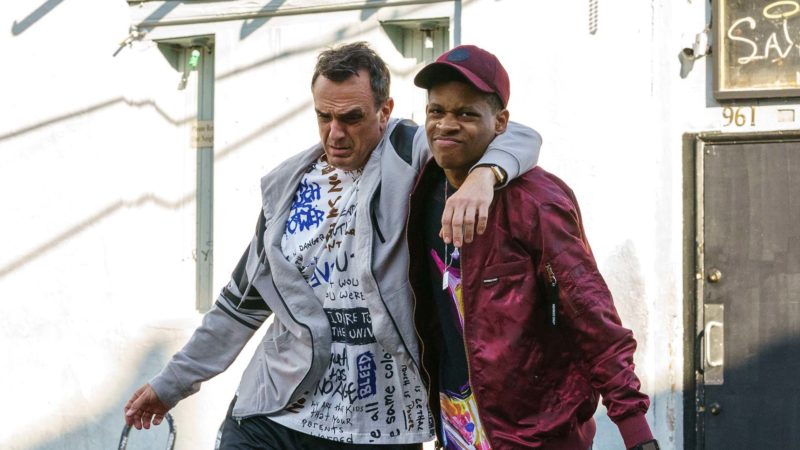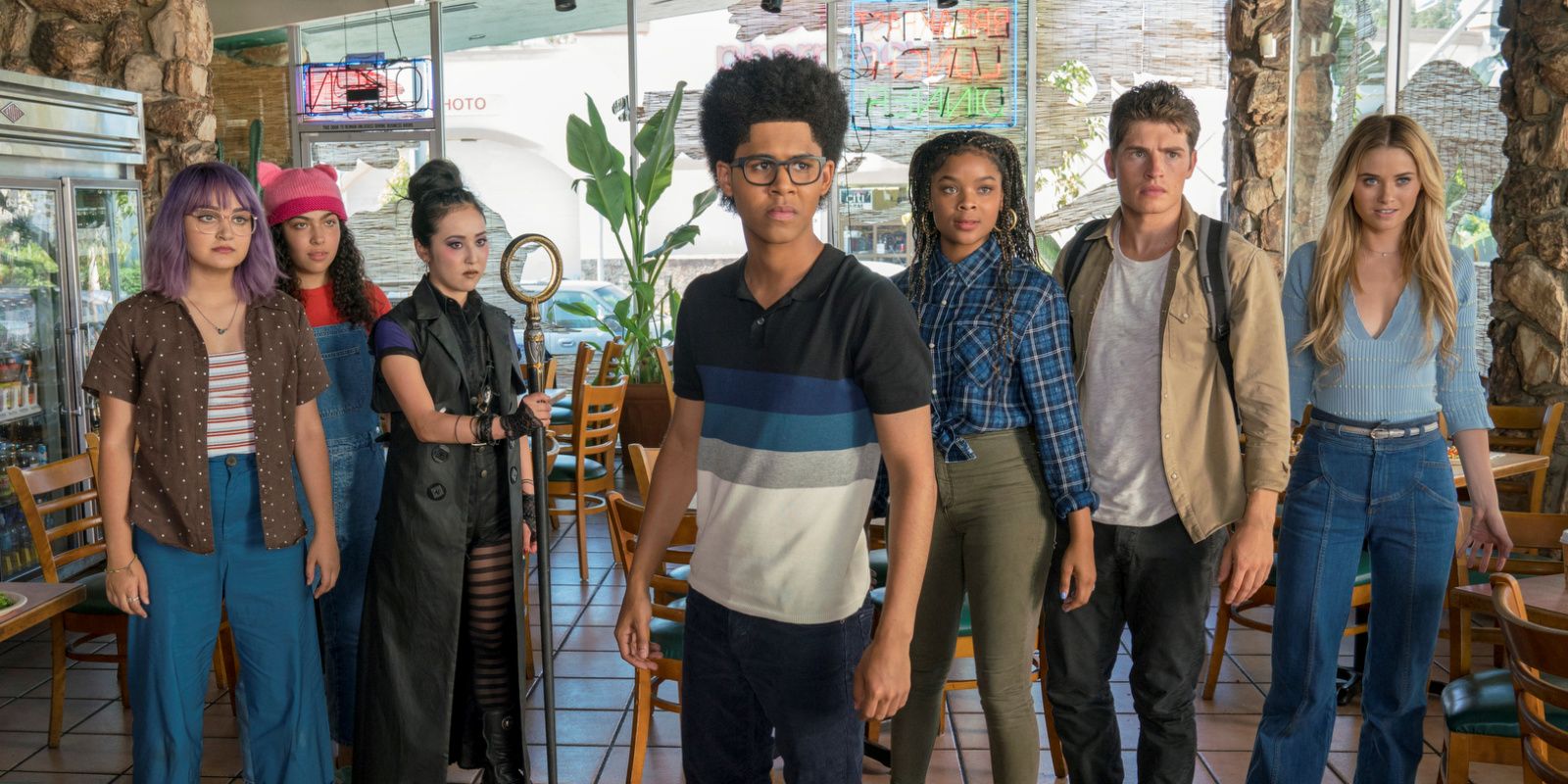 |
| No longer the primary bread-winner, Frank has to adopt some new roles within his family, including taking part in his daughter's troop meetings. He doesn't take to it very well. |
An animated show that improves upon its solid first season and may be on its way to becoming a rather unique entry into the canon of excellent animated U.S. TV shows.
The first 10-episode season of F is for Family introduced us to the Murphy family, who are based on actor and comedian Bill Burr's own Irish-American family during Burr's childhood in 1973. The show focuses mostly on the father, Frank, a hard-working father of three who is thoroughly locked into the narrow perspectives typical of men in that era. To Frank, the concept of the nuclear family, where the man works and the woman stays home to raise the kids, is the only structure. But while Frank has the semblance of this "perfect" situation, he is a man with a hair-trigger temper, often set off by his disappointments in his kids and his own professional shortcomings. The first season actually had a legitimate, well-crafted arc to it, with Frank's already-agitated world getting further up-ended when he first loses his job at the local airport. This is all exacerbated when his wife, Sue, decides to get a job of her own.
Season 2 continues the story line, with Frank now working a reliable but menial job delivering concession sundries around town, while Sue tries to work her way up through a Tupperware-like company dominated by ultra-chauvinistic men. This second season takes the strengths of the first one, hones them a bit further, and goes deeper into the most unique thing about the series - the need for Frank to accept how his family and the world are changing around him. After losing his job at the airport, he's had to swallow his considerable pride and take a job delivering vending machine concessions. As he muddles through this existential crisis, Sue continues to put together a bit of a career in plastic-ware, though the misogyny continues to run thick. All the while, their three kids try to find their way through a gantlet of bullies, academic failure, and society's expectations for women.
I must confess that I had taken a breather from this show after watching the first three episodes, but I really got into it once I returned and finished the second season. It appears that the writers are actually making a very conscious effort to do something that very few animated series do - have the characters actually develop. Over the first 22 episodes, each of the five family members, and even a few of their friends and neighbors, seem to learn a few things. No, none of them comes anywhere close to evolving into a fully "healthy" person (where's the humor in that?), but they lurch or are pushed there in noticeable ways. And for anyone who has a sense of what typical life was like in the U.S. in the early and mid-1970s, you know just how many cultural shifts were happening. Watching the disillusioned and easily-enraged Frank deal with all of this is certainly hilarious, but it also provides some reasonably compelling drama between the laughs.
I'll soon be tuning into the third season, which was released not long ago on Netflix. I hope the show continues down the path laid out so far, as it has developed something of its own place in a landscape awash with animated series which can be uproariously funny but wherein there is little to no continuity or character growth.
 |
| The ever-responsible Charles drags the ever-intoxicated Jim out of another drunken sinkhole. This image is a solid metaphor for much of their relationship. |
A surprisingly strong follow-up season to a show that has impressed me simply by building on what could have been a one-note premise which could have grown very old very quickly.
At the end of the show's initial 8-episode season, the ferociously addicted Jim Brockmire had been offered a broadcasting gig for the minor league Crawdaddy's in New Orleans - a job which he promptly accepted, leaving behind the lowly Frackers of the burnt-out burg of Morristown, Pennsylvania. The second season picks up well into Brockmire's first season with the Crawdaddy's, where he has been doing fine work despite regularly indulging in nearly every vice known to mankind. The only thing that keeps him in any financial security is the management of Charles, the young man who was his assistant in Morristown. Brockmire experiences a bit of a hiccup in his dream of returning to the big leagues again when he is pitted against fellow broadcaster Raj, a handsome young man of Indian descent who, while knowing little about sports, knows exactly how to pander to his audience to raise his popularity and brand.
This season was just as funny as satisfying as the first, as we get a bit more insight into Brockmire's and Charles's backgrounds. We see Jim deal with the death of his father, and Charles have to confront his highly self-involved family. We get the addition of several new supporting characters, as well as heavy doses of the pitch black humor that set the first season apart.
The only reason I would steer anyone away from this show is that Jim Brockmire is a thoroughly depraved individual, and the show doesn't shy away from exhibiting him at his drug- and booze-drenched worst. People who find no humor in addiction will likely find no humor in this show, despite the fact that it is far from any sort of endorsement for substance abuse. For my part, I was glad to learn that the show has been renewed for both a third and fourth season.
 |
| The Runaways, plus one. The members of the crew tend to take turns making poor decisions, which is something one would expect from a group of teenagers from wealthy families. |
A Marvel Cinematic Universe (MCU) TV show that continues the tone and quality of its first season, even if the longer episode run more clearly exposes its weaknesses.
The ten episodes of season two still see the six titular runaways hiding from their parents while they attempt to learn the secrets of Jonah - the man, or creature, that is at the center of nearly all of their horrible crimes. The Runaways make various sorties from their hideout in a buried, secret old mansion just outside of L.A., and they learn more about their own mysterious powers and themselves as people.
The strongest part of the show is the plot. The story behind Jonah and his long relationship with the Runaways' parents is unfolded well, and there are more than a few curious twists to the story. The nature of his own amazing abilities is also compelling enough to carry the season fairly well. There was also one very intriguing connection to the greater MCU raised towards the end of this season's run. In fact, it is by far the question that I most want to know the answer to.
I did find myself tiring of the interpersonal drama, although I do realize that this is a show aimed more at viewers between ages 11 and 18. Beyond that, though, the dialog and scenarios can sometimes feel a bit contrived to achieve more dramatic effect. And there are some plot holes that rear their heads as the story moves along, both within the story's internal logic and in the show's greater place in the MCU.
I'm undecided as to whether I'll tune in for the third season, which is likely to happen. Like nearly every other MCU show, it is decent enough for a dedicated fan of the franchise to enjoy on some level. However, with more shows coming, I sense that I will likely be drawing a line soon. Shows geared towards younger viewers, such as Runaways, the worthy Cloak and Dagger, and maybe the forthcoming Disney+ shows scheduled to come out later in 2019 may be on the chopping block. There are only so many hours in the day, and there is only so much TV I have the time or desire to watch. The Runaways could be a casualty of those realities.
No comments:
Post a Comment